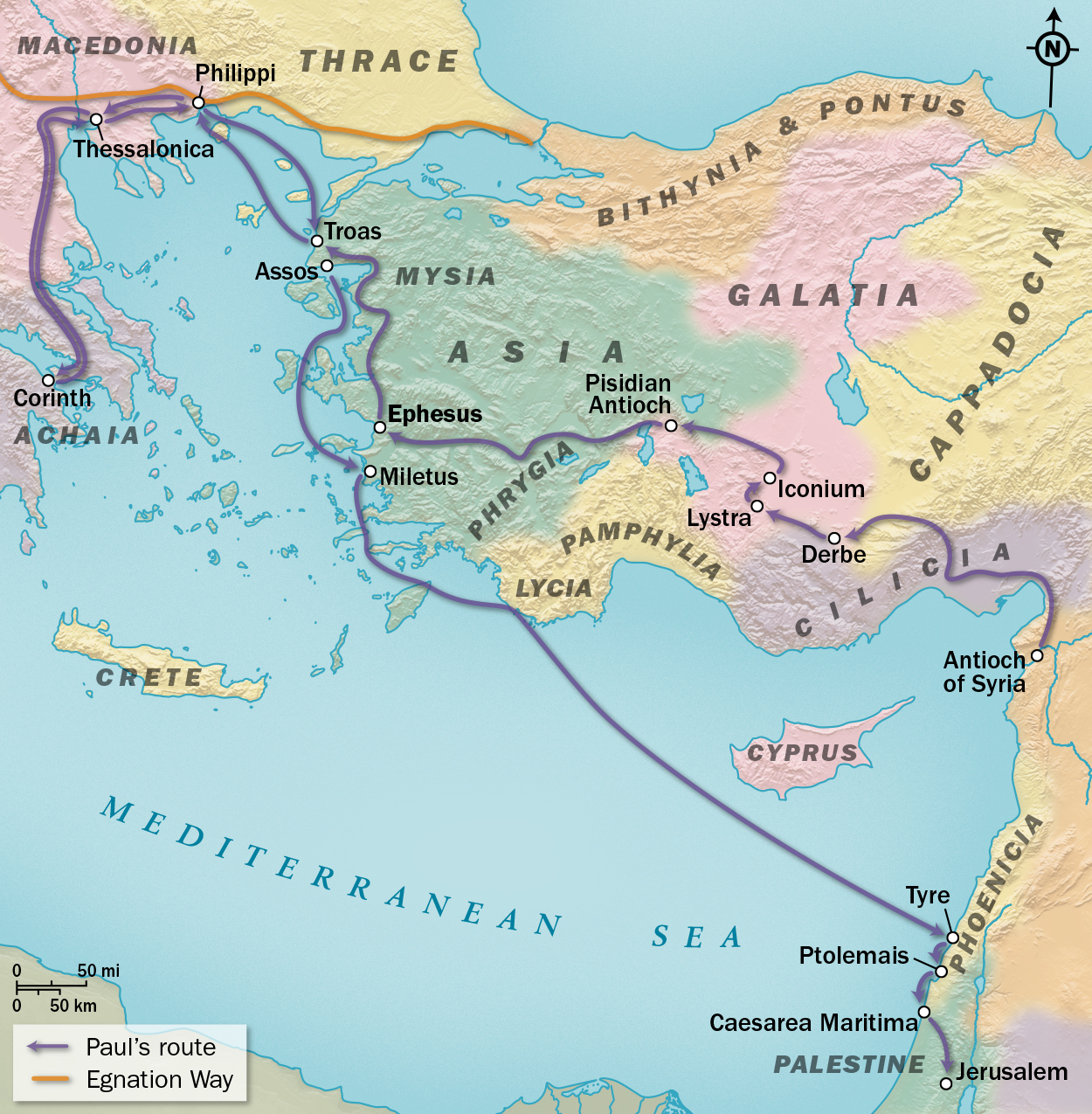CHAPTER SIXTEEN
The Letter to the Ephesians
Orientation
Ephesians is a majestic letter. The great Protestant Reformer John Calvin regarded it as his favorite book of the Bible. Samuel Taylor Coleridge, the English poet and literary critic, described it as “one of the divinest compositions of man.” Leading twentieth-century biblical scholar F. F. Bruce called it “the quintessence of Paulinism,” while contemporary commentators regard it as one of the most significant documents ever written.
The Historical Origins of Ephesians
The Authorship of Ephesians
Ephesians has played a pivotal role in the theology of the church throughout the ages, providing major contributions to themes such as union with Christ, predestination, salvation, grace, the church, Jew-gentile relations, marriage, and spiritual warfare. This short letter has left a huge legacy.

Figure 16.1. Location of Ephesus [© Baker Publishing Group]
In Captivity
Ephesus
At Ephesus
Every Spiritual Blessing in Christ
READ EPHESIANS 1:1–14
After a standard greeting (1:1–2), Paul begins an extended doxology that is introduced and summarized by verse 3: “Praise be to the God and Father of our Lord Jesus Christ, who has blessed us in the heavenly realms with every spiritual blessing in Christ” (NIV). The heavenly realms and spiritual blessings are a key focus of the letter. Moreover, these blessings come us to “in Christ”; union with Christ is a central theme. Several blessings are mentioned in the doxology, including predestination, adoption, redemption, forgiveness of sins, and the Holy Spirit. These blessings are bestowed on us “in him” (1:4–13).
In Christ
Psalms and Isaiah
Adoption as Sons and Daughters
The doxology includes what are arguably the theme verses of the letter: “He made known to us the mystery of his will, according to his good pleasure that he purposed in Christ as a plan for the right time—to bring everything together in Christ, both things in heaven and things on earth in him” (1:9–10). Everything in heaven and earth is brought together in Christ. Christ is the centerpiece and central coherence of the entire cosmos, which finds its purpose and goal in him.
The Structure of Ephesians
READ EPHESIANS 1:15–23
Paul then prays that God would give his readers “the Spirit of wisdom and revelation in the knowledge of him” (1:17). He wants them to know the riches of their glorious inheritance and God’s power that raised Jesus Christ to his right hand, above all (1:18–21). God has put all things under Christ’s feet and made him head of the church, his body (1:22–23).
We see here the importance of knowledge: wisdom, revelation, knowing God better, and knowing God’s power are important for believers. We also see the exalted Christ towering above all competing spiritual forces.
Participation with Christ
Salvation
READ EPHESIANS 2:1–10
The argument of the letter properly begins in chapter 2, with the assertion that prior to Christ, all people were “dead in [their] trespasses and sins” (2:1). Walking according to the world and the ruler of the air (the devil), all people live for the gratification of the flesh (2:2–3). This is a hopeless situation, since spiritually dead people are unable to please God or reach out to him on their own.
The Mystery of Christ

Figure 16.2. Statue of Artemis [Shutterstock / Valery Shanin]
God alone can change the situation. He makes people alive with Christ, raising them up and seating them with him in the heavenly place. The mechanism for salvation is participation with Christ. His resurrection becomes our resurrection, his ascension becomes our ascension, and we go from being dead and buried to being seated with God in heaven. Since it is God’s work that makes us alive with Christ, it is by grace we are saved, through faith (2:4–9). Our works cannot achieve salvation; rather, we become God’s workmanship, “created in Christ Jesus for good works” (2:10).
Reconciliation
READ EPHESIANS 2:11–22
The vertical reconciliation with God in Christ has horizontal implications, which Paul spells out for Jews and gentiles (2:11–22). The gentiles were far off, strangers to Israel and God’s promises (2:11–12). But now Christ has made the two (Jew and gentile) one by making peace through the cross (2:13–16).
Peace between the Nations
While at one time the gentiles had only limited access to the presence of God in the temple, now they are built together with believing Jews into a holy temple, in which God dwells by the Spirit (2:18–19). This is an extraordinary reversal of fortune for gentiles; now in Christ they are coheirs and equal partners with believing Jews.
Incorporation
Mystery Revealed
READ EPHESIANS 3:1–21
Paul reflects on his own role in proclaiming Christ to the gentiles, and how God has revealed a formerly hidden secret: in Christ the gentiles are coheirs and partakers of the promise (3:1–6). The “promise” likely refers back to God’s promise to Abraham that all peoples of the earth would be blessed through him (Gen. 12:1–3). A big question mark left hanging at the end of the Old Testament is how exactly the peoples of the earth will be blessed through Abraham. Paul’s point is that in Christ that question has now been answered. Now that all people are saved through faith—and not through membership in the nation of Israel—the gentiles will be blessed in Christ.
Ecclesiology: The Theology of the Church
The Body of Christ
READ EPHESIANS 4:1–32
Paul begins the second half of the letter by stressing the unity of the body of Christ. We share in the one body, one Spirit, one hope, one Lord, one faith, one baptism, and one God and Father of all (4:1–6).
But the attention then turns to the necessary diversity within the body. From his ascended and victorious position, Christ gave grace to each one as he apportioned it (4:7–10). In particular, he gave the apostles, prophets, evangelists, pastors, and teachers (4:11). Their role is to equip the saints for the work of ministry, which is building up the body of Christ (4:12). The goal of all this is that the body will attain unity and maturity, with members no longer being little children who are tossed around by false teaching and human craftiness (4:13–14).
As members of the body, believers are to put off the old self and replace their former practices and attitudes with godly alternatives that will build others up. Instead of lying, believers should speak the truth (4:25); instead of stealing, they should work and give to others (4:28); instead of being consumed by bitterness and malice, they should be kind, compassionate, and forgiving (4:31–32).
Ephesians and Colossians
Walking in Love, Light, and Wisdom
READ EPHESIANS 5:1–17
Children imitate their father, and so believers are to walk in love, just as Christ loved us and gave himself up for us (5:1–2). Paul leans further on the “walking” metaphor as he highlights the incompatibility of deeds of darkness for the children of God (5:3–14). Believers are now light in the Lord and ought to walk as children of light (5:8–9). Not only will they take no part in the works of darkness, but also they will expose them (5:11). Believers are to consider carefully how they walk, choosing to walk in wisdom (5:15), redeeming the time, and understanding the will of the Lord (5:16–17).
Filled with the Spirit
READ EPHESIANS 5:18–6:9
Rather than getting drunk on wine, believers are to be filled with the Spirit (5:18). The Spirit-filled life consists of speaking to one another in psalms, hymns, and spiritual songs, giving thanks to the Father, and submitting to one another (5:19–21).
Married to Christ
Submission becomes the pivot point into the household code of Ephesians, and Paul spells out a series of asymmetrical relationships, with wives submitting to husbands, children obeying their parents, and slaves obeying their masters. Husbands are to love their wives as Christ loves the church, fathers are to instruct their children without provocation, and masters are to remember that they too have a master in heaven (5:22–6:9).
Mutual Submission?
Spiritual Warfare
READ EPHESIANS 6:10–20
The concluding section of the letter acknowledges that believers’ battle is not against flesh and blood, but against the spiritual forces of darkness (6:10–12). Believers are to take up the whole armor of God to stand against evil, donning the belt of truth, the breastplate of righteousness, the sandals of peace, the shield of faith, the helmet of salvation, and the sword of the Spirit, which is the word of God (6:13–17).
These well-known images of the Roman soldier also have a background in Isaiah, as the Lord and his Messiah battle their enemies. The armor of God is shared with his people so they are fully equipped to take their stand.

Figure 16.3. Statue of a Roman soldier [Shutterstock / Sanit Fuangnakhon]
High Impact
READ EPHESIANS 6:21–24
Ephesians closes with a short greeting that does not mention any of Paul’s readers by name. The only person named is Tychicus, whom Paul apparently sent to deliver the letter.
Implementation—Reading Ephesians as Christian Scripture Today
The theological contribution of Ephesians is hard to overstate. It presents a view of the cosmic Christ, with Jesus as the central reconciling figure of the entire cosmos, with all human history seen within a divine plan that spans before creation to its consummation, and with all people caught up in the intersection between worldly and spiritual forces.
While the Protestant tradition has tended to focus on themes like justification by faith and the atoning death of Jesus, Ephesians pushes us to reflect on complementary themes such as the importance of union with Christ, Jesus’s ascension to the right hand of the Father, and the reality of spiritual warfare.
The letter provides a clear exposition of salvation by grace through faith, and the reconciliation of Jew and gentile in Christ. The nature of the church as the body of Christ is instructive, as is the household code. All of these issues continue to shape the church’s theology and practice in profound ways.
- Read the doxology in Ephesians 1:3–14 and contemplate how each spiritual blessing mentioned there is mediated to believers through Jesus Christ. How do the blessings come “in him”?
- Articulate the logic driving the argument from Ephesians 2:1 to 4:16. How does “salvation by grace through faith” construct the body of Christ?
- Read Colossians and make a list of similarities and differences between it and Ephesians.
- Read Galatians and notice the differences in purpose, tone, and argument between it and Ephesians.